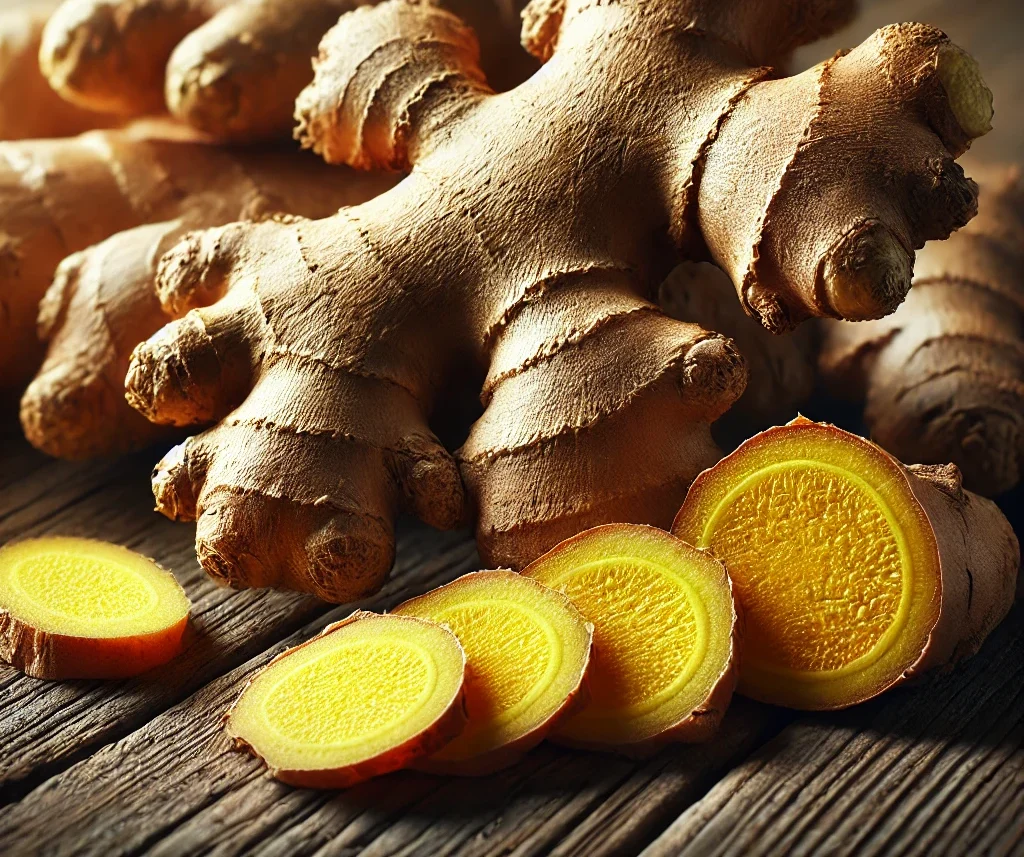Ginger, a popular root with a distinctive spicy flavor, has been used for centuries in both culinary and medicinal practices. Known for its powerful anti-inflammatory and antioxidant properties, ginger offers a wide range of health benefits. From aiding digestion to relieving nausea and reducing inflammation, this versatile root can be incorporated into various dishes or consumed as a tea for its natural healing effects.
Health Benefits of Ginger
Relieves Nausea: Ginger is highly effective for reducing nausea, including morning sickness, motion sickness, and nausea caused by chemotherapy.
Reduces Inflammation: Ginger’s anti-inflammatory properties help reduce pain and swelling associated with conditions like osteoarthritis and muscle soreness.
Supports Digestive Health: Ginger improves digestion by speeding up stomach emptying, reducing bloating, and relieving indigestion.
Boosts Immune Function: Ginger’s antimicrobial and antioxidant properties enhance immunity, helping the body fight infections.
Lowers Blood Sugar Levels: Ginger may help regulate blood sugar levels and improve insulin sensitivity, benefiting people with diabetes.
Eases Menstrual Pain: Studies show that ginger can be as effective as painkillers in reducing menstrual cramps.
Promotes Heart Health: Ginger helps improve circulation, lower cholesterol, and reduce blood pressure, all of which support cardiovascular health.
May Protect Brain Health: Ginger’s anti-inflammatory and antioxidant effects may help protect against neurodegenerative diseases like Alzheimer’s and Parkinson’s.
Uses of Ginger
Culinary Uses
Fresh Ginger: Fresh ginger is commonly used in stir-fries, curries, soups, and marinades to add a zesty, warm flavor. It can be grated, sliced, or minced to release its aromatic oils.
Ginger Tea: Ginger tea is a popular drink for soothing the stomach, aiding digestion, and providing warmth, especially in colder months. It’s often made by steeping fresh ginger in hot water.
Baked Goods: Ground ginger is a key ingredient in many baked goods, such as gingerbread cookies, cakes, muffins, and pies, lending a sweet and spicy flavor.
Smoothies and Juices: Fresh ginger can be blended into smoothies or juiced with fruits and vegetables to add a zingy, refreshing flavor and a health boost.
Condiments and Sauces: Ginger is used to flavor sauces, dressings, and condiments, such as ginger soy sauce, dipping sauces, and salad dressings.
Pickled Ginger: In Japanese cuisine, ginger is often pickled and served alongside sushi or as a condiment with rice dishes.
Household Uses
Natural Cleaner: The antimicrobial properties of ginger make it useful in homemade cleaning solutions. It can help eliminate odors and act as a natural disinfectant.
Pest Repellent: Ginger’s strong scent can also help keep insects like ants and mosquitoes at bay when used in some DIY pest control recipes.
Safety Considerations
Digestive Sensitivity: While ginger is known for its digestive benefits, consuming too much ginger, especially in concentrated forms (such as ginger extract or supplements), may cause heartburn, indigestion, or mild stomach discomfort in some individuals. Moderation is key, especially if you are prone to acid reflux or gastritis.
Allergic Reactions: Although rare, some individuals may experience an allergic reaction to ginger, leading to symptoms such as rash, itching, swelling, or trouble breathing. If you experience any of these symptoms after consuming ginger, seek medical attention immediately.
Blood Thinning: Ginger has natural blood-thinning properties, which can be helpful for cardiovascular health but may cause issues for those taking blood-thinning medications (like warfarin) or those with bleeding disorders. If you are on such medications or have a bleeding disorder, consult a doctor before consuming large amounts of ginger.
Pregnancy Considerations: Ginger is generally considered safe for use during pregnancy, especially for relieving morning sickness. However, it should be consumed in moderation, as excessive amounts (more than 1 gram per day) may increase the risk of complications. Always consult with a healthcare provider before taking ginger supplements during pregnancy.
Interaction with Medications: Ginger may interact with certain medications, especially those used to control blood pressure, blood sugar, and blood thinning. If you are taking medication for any of these conditions, it’s important to consult with a healthcare provider to ensure that ginger won’t affect your treatment.
Conclusion
Ginger is not just a flavorful addition to your kitchen, it’s a powerful natural remedy with numerous health benefits. Its anti-inflammatory, antioxidant, and digestive properties support everything from reducing nausea and pain to boosting immunity. By adding ginger to your diet, you can enjoy its many health-promoting properties while adding a unique flavor to your meals and drinks.
